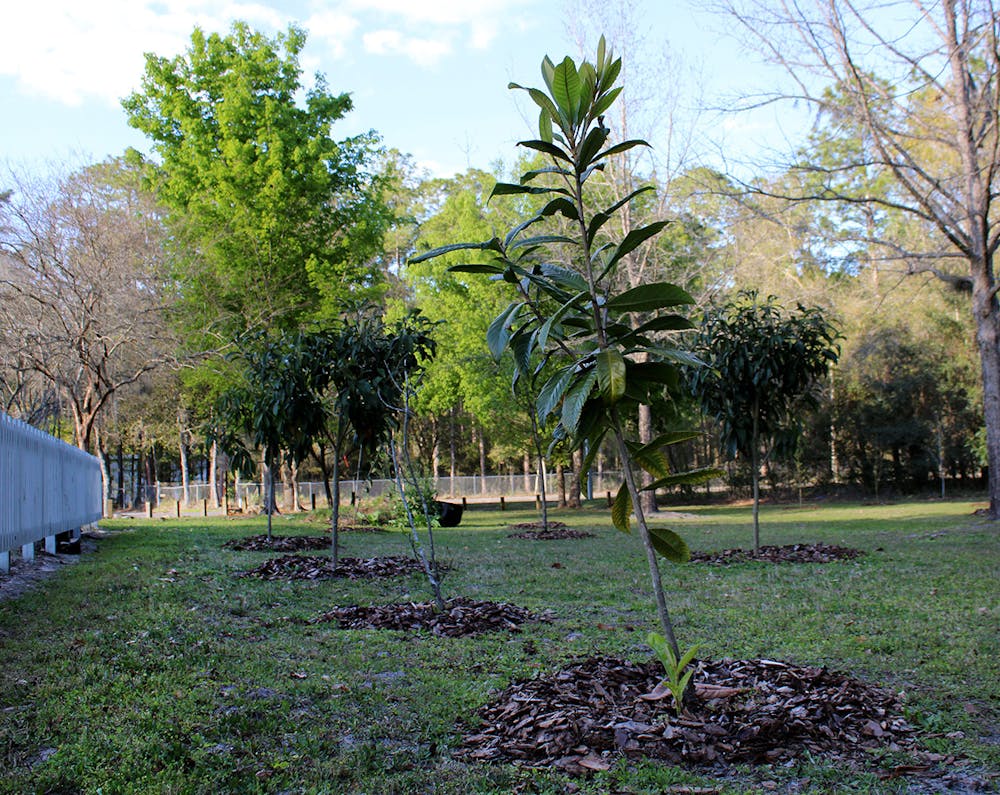The City of Gainesville’s plan to provide the community with fresh produce has come to fruition.
The Edible Groves project, which is part of a city initiative to get fresh fruit and produce to people with unreliable access to food.
Two groves were planted at Smokey Bear Park in Northeast Gainesville and Fred Cone Park in East Gainesville. Both groves were completed by the end of February. A third grove will be planted in April at Bountiful Boulevard, located on the block of 4200 SW 40th Blvd, said Eric Kohnen, the city’s horticulturist.
Types of trees planted include chestnut, orange, persimmon, kumquat, loquat, nectarine, pecan, peach, pear, mulberry and tangerine. There are close to 70 new fruit trees at Smokey Bear Park, while Fred Cone park is home to about 30 to 40 trees. The Bountiful Boulevard Park plans to have 40 to 60 trees planted. Some of the fruit will be ripe in the next few months.
The project, which cost about $9,000, was funded by Tree Mitigation Funds and Wild Spaces and Public Places, city arborist Dave Conser said.
Initiatives such as the Edible Groves and like the East Gainesville’s community grocery store help address food insecurity, which is when a person doesn’t have a reliable food source. Gainesville’s food insecurity rate has since risen to almost 17% in 2020 due to problems brought on by the COVID-19 pandemic.
People can pick directly from the trees, Conser said. There is a plan to use a tag system, where a red tag on ripening fruit indicates it's not quite ready to pick and a green tag indicates it’s ready to pick, he said.
“This is an important project for the city and really trying to help our neighbors,” Conser said.
He said volunteers from Keep Alachua County Beautiful, a nonprofit organization dedicated to helping the environment, will tend the groves. There are also plans for a permanent irrigation system and a permanent maintenance staff to take care of the plants.
The city pushed for the project in September as part of the city’s 2020-2021 action agenda to develop a local food system action plan, said Karissa Raskin, the civic collaboration specialist for the city. She served as the project manager for the groves project.
The idea to provide these healthy options year-round came two years ago when neighbors raised a suggestion during a city workshop to address food accessibility.
“Food accessibility is a major issue in our community, and particularly in the East Gainesville community,” she said.
While this project aims to help address food issues, Raskin said this project is only one step to help the community.
“It is just one tool in the toolbox for how we can make fresh food available in the community,” she said.
Kohnen said he was responsible for getting the nursery stock, which are all the plants available for purchasing or selling, and designing the layout of the parks. When he decided on tree types, he said he had to account for Gainesville’s distinctive climate and different types of tree pollination, such as self-pollination and cross pollination. When making selections, he tried to make sure that the groves will have as much year-round fruit as possible.
“Our unique issue here in Gainesville is that we can grow a little bit of the tropicals and a little bit of the temperate fruits,” Kohnen said. “But we have to be really selective with what we grow.”
He said his favorite aspect of the project is seeing the satisfaction from the community.
“For me, personally, I think this is the most rewarding project I've ever done,” he said. “It's just the looks on people's faces when they walk by it.”
Contact Michelle Holder at mholder@alligator.org. Follow her on Twitter @michellecholder.

Michelle Holder is a second-year journalism student at UF minoring in entrepreneurship and a Metro reporter at The Alligator. She is from Ponte Vedra Beach, Florida. In her free time she enjoys going to coffee shops and reading.






